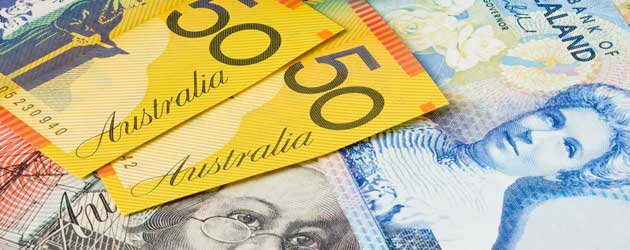
On Thursday the Pound (GBP) exchange rate softened against both the Australian (AUD) and New Zealand Dollars (NZD) as positive data out of Australia lent support and as the US Dollar (USD) was softened by disappointing data releases.
On Wednesday, the Pound exchange rate continued to advance against both the Australian Dollar and New Zealand Dollar and is forecast to continue pushing higher as UK GDP data comes into focus. Tumbling Iron ore prices and comments made by the Reserve Bank of Australia ensured that the ‘Aussie’ continued to fall steeply against its major peers.
The Pound strengthened strongly against both the Australian Dollar and New Zealand Dollar exchange rates on Tuesday. as concerns over falling commodity prices continued to weigh heavily.
The Pound (GBP) made further gains against the Australian (AUD) and New Zealand Dollars (NZD) on Monday as the UK currency was supported by speculation that it will remain supported as the Bank of England’s policy diverges from those of the European Central Bank and Bank of Japan.
Earlier, the Pound Sterling to Australian Dollar (GBP/AUD) and Pound to New Zealand Dollar (GBP/NZD) exchange rates were trading higher on Monday due to a stronger US Dollar (USD) weighing upon the Tran Tasman currencies.
Last week saw both the Australian Dollar and New Zealand Dollar rally strongly against the Pound as China’s Central Bank took economists by surprise when it announced further monetary easing measures in a bid to improve growth and tackle the threat posed by an economic slowdown. After the news was announced both of the Tasman currencies spiked against their major peers.
On Monday, however both currencies gave up gains as the US Dollar strengthened on the back of increased speculation that the Federal Reserve is edging closer to raising interest rates. Also sending the currencies lower was continuing concern over declining iron ore and dairy prices.
Last week saw Australia’s biggest export, iron ore, and cap a fifth weekly decline with prices tumbling close to the lowest level since 2009.
‘The worst is yet to come. Not only will we see increased supply from Brazil and Australia, also there’s an element of collapsing demand which hasn’t been reflected in the price yet,’ said Liang Ruian, a fund manager based in Shanghai.
NZD/GBP Exchange Rate Continues to Drop
The ‘Kiwi’ meanwhile continued to suffer as dairy prices resumed their downward dip. The export of cheese and other dairy products are New Zealand’s largest exports.
The surprise decision by the Chinese central bank to introduce more monetary easing measures briefly saw both currencies spike higher but those gains were dented by the strengthening US Dollar and commodity concerns.
The Pound advanced after traders deemed last week’s declines as overdone. Sterling had been weakened broadly following the by-election win of anti-EU party UKIP.
Today however a poll released by YouGov showed that support for the party remained steady despite the victory, easing investor concerns and in turn supporting the Pound.

